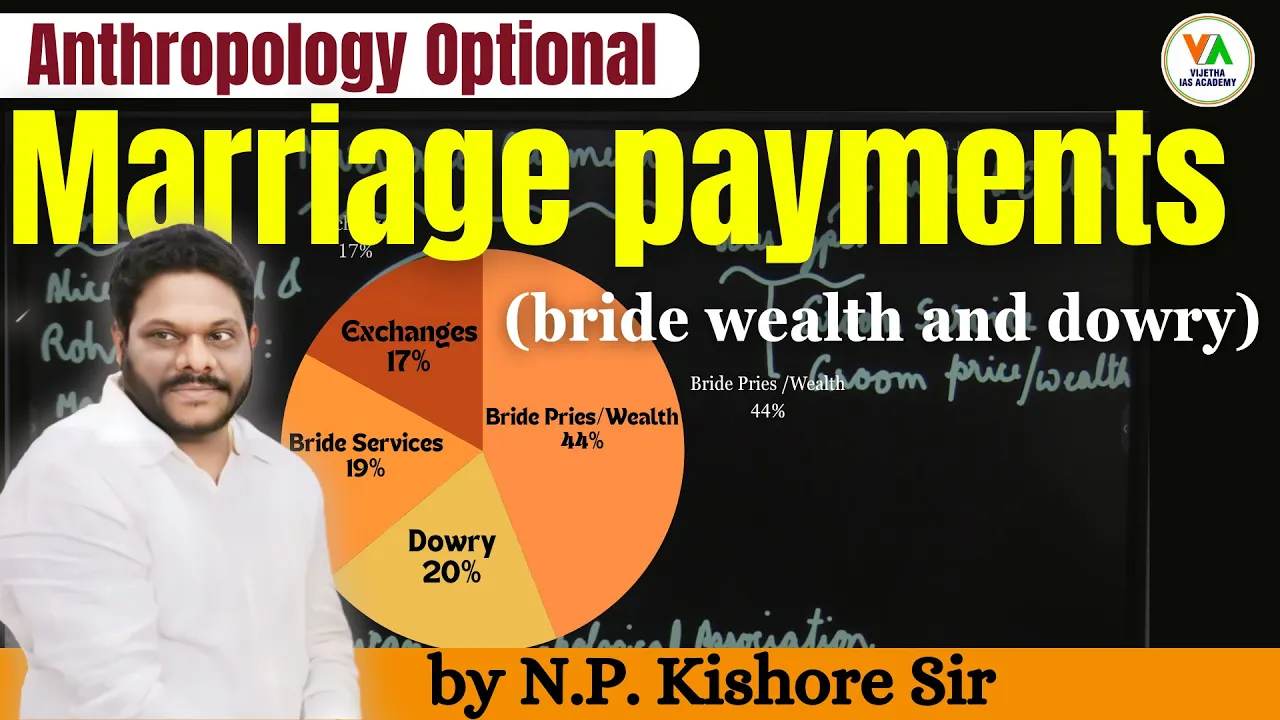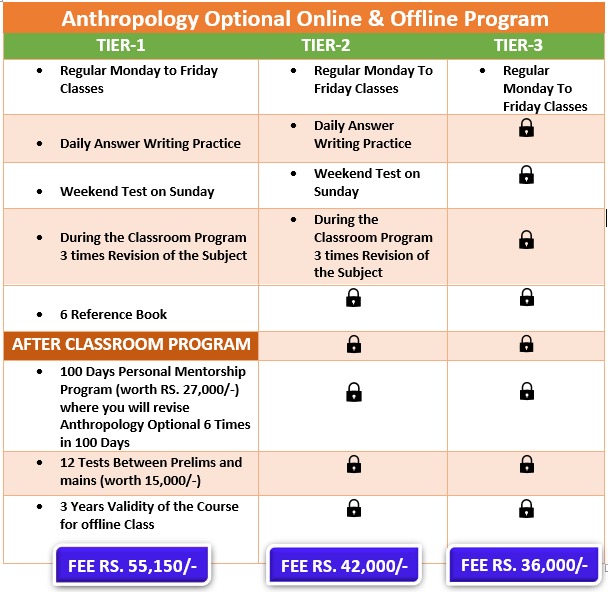
Marriage Payments in Anthropology Optional by N.P. Kishore Sir
When studying Marriage Payments in Anthropology Optional, understanding the concept of marriage payments is crucial. Under the expert guidance of N.P. Kishore Sir at Vijetha IAS Academy, this topic is explained comprehensively, equipping students with the knowledge needed to excel in their anthropology optional papers.
Marriage payments refer to the transfer of wealth, goods, or services between families during the process of marriage. The forms and functions of these payments vary widely across cultures, and N.P. Kishore Sir's anthropology course offers an in-depth look at these variations and their implications.
For more information about Marriage Payments in Anthropology Optional topic click on my youtube Link : https://www.youtube.com/watch?v=LbXCIGgFtnQ
Types of Marriage Payments in Anthropology Optional
-
Bride Price (Bride Wealth): This involves the groom's family providing goods or money to the bride's family. The practice is widespread in Africa, the Pacific Islands, and parts of Asia. Bride price serves as compensation to the bride's family for the loss of her labor and fertility.
-
Dowry: A reverse form of marriage payment, dowry involves the bride’s family giving wealth to the groom or his family. This practice is common in South Asia, especially in India. Dowry payments have socio-cultural implications that can lead to discussions around gender, power, and economic exchange, all of which are explained expertly by N.P. Kishore Sir.
-
Bride Service: Instead of material goods, the groom works for the bride's family as a form of payment. This is prevalent among some Native American and African tribes.
-
Gift Exchange: In some cultures, marriage payments can take the form of gift exchanges between both families. These gifts symbolize mutual respect and the establishment of familial ties.
By covering these variations, students gain insight into the different economic, social, and symbolic functions of marriage payments. N.P. Kishore Sir explains how these practices serve to solidify alliances between families, redistribute wealth, and reinforce social hierarchies.
Theoretical Approaches to Marriage Payments in Anthropology Optional
Anthropologists have developed several theories to explain the function and significance ofMarriage Payments in Anthropology Optional
-
Functionalism: According to functionalists, marriage payments help to ensure social cohesion by formalizing alliances between families. This view emphasizes the integrative function of marriage in maintaining social stability.
-
Marxist Approach: Marxist anthropologists view marriage payments as a form of economic exchange that reflects the underlying class structure of society. In societies where dowry or bride price exists, these payments can be seen as mechanisms that reinforce economic inequalities.
-
Symbolic Anthropology: This approach looks at how marriage payments symbolize larger cultural values. For instance, bride wealth might symbolize fertility, while dowry could represent a family's social status. These symbolic meanings are explored thoroughly by N.P. Kishore Sir at Vijetha IAS Academy.
Marriage Payments in Anthropology Optional and Gender Relations
One of the most important discussions surrounding Marriage Payments in Anthropology Optional is how they influence gender dynamics. Under N.P. Kishore Sir's guidance, students will learn how payments like dowry and bride price affect the status and roles of women in different societies. While bride price may raise the value of a bride in some cultures, dowry can sometimes lead to exploitative practices, particularly in patriarchal societies.
Case Studies on Marriage Payments in Anthropology Optional
N.P. Kishore Sir provides students with case studies to illustrate the various forms of Marriage Payments in Anthropology Optional across different societies:
-
Nuer of South Sudan: Among the Nuer, bride wealth is paid in cattle, and the marriage is only valid when the full amount is delivered. This ensures that marriage is seen not just as a union between two individuals, but also between their respective families.
-
Indian Dowry System: In India, dowry often serves as a way for families to maintain or improve their social standing. However, the practice has led to significant social problems, including dowry-related violence. Through N.P. Kishore Sir's teaching, students will gain a nuanced understanding of this complex issue.
-
The Tiv of Nigeria: The Tiv people practice bride service, where the groom works for the bride's family as part of the marriage arrangement. This is a fascinating example of non-monetary marriage payments, which N.P. Kishore Sir thoroughly explains during his anthropology lessons.
Why Choose Vijetha IAS Academy for Anthropology Optional?
Choosing the right coaching institute is crucial for your UPSC preparation. At Vijetha IAS Academy, Anthropology Optional is taught by the experienced N.P. Kishore Sir, whose deep understanding of the subject helps students tackle complex topics like marriage payments with ease. His personalized approach to teaching and focus on Marriage Payments in Anthropology Optional ensures that students are well-prepared for their exams.
Moreover, Vijetha IAS Academy has mentored over 100,000 students, providing them with top-tier resources and guidance. With their student-centric approach, it's no surprise that the academy is considered one of the best for Anthropology Optional Coaching in India.
Conclusion
If you're preparing for Marriage Payments in Anthropology Optional in UPSC, it's essential to stay updated with the latest SEO-friendly content. N.P. Kishore Sir ensures that students receive comprehensive materials on topics like marriage payments, enabling them to understand the subject fully and perform well in their exams.
By understanding and mastering critical anthropology concepts such as bride price, dowry, and bride service, students are better equipped to answer UPSC questions effectively.

